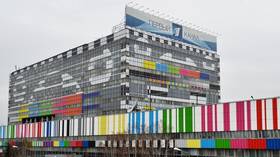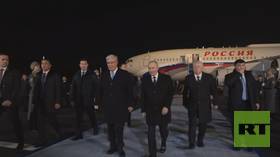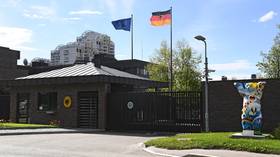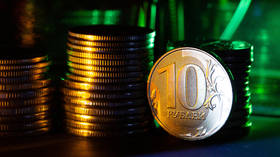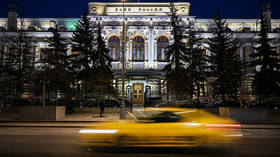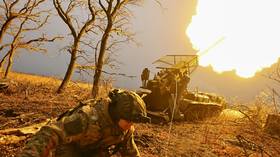Market Watch November 17: No lift in sight

Russian stocks fell on Monday as the outcomes of the G20 Meeting in Washington failed to impress investors worldwide, with crude and most metals again easing, and the RTS and Micex adding to their collection of stoppages over recent months.
The G20 meeting may have come and gone but the markets aren't looking like pricing in any outcomes if Mondays trade is anything to go by. No sooner had the Messrs Sarkozy, Brown and Medvedev, amongst numerous others, come away with the words they wanted in the communiqué – to the effect that there will be a focus on regulation and standards, and that governments have a green light to spend – and no doubt with President Bush also able to point to the fact there was nothing in the same communiqué suggesting that the entire capitalist system was about to be renationalized, than the worlds markets have gone back to about the position they were in last Thursday. For those who have managed to wipe last Thursday, or indeed numerous other days since about mid year, the outlook then was bleak. Which sort of makes one wonder what all the clamour was for, if grateful for the fact it wasn't touted as an AAA rated investment opportunity, and wondering also when someone is going to do something about finding some buyers – for almost anything.
The weeks trade kicked off in Asia with the Nikkei managing a minor 0.71% gain in very light and volatile trade, after being as much as 3% lower during the day. That was despite the unveiling of 3rd quarter GDP data showing that Japan is now in Recession. The phlegmatic investor response possibly stems from the fact the country has bounced back and forth between recession and deflation for so long that another journey into negative growth wont hurt that much. Further south in Hong Kong the lightest trade in 5 months saw the Hang Seng barely moved – down 0.10%. More ominously for Russian investors, the commodity heavy ASX lost 2.2% with resources and energy stocks hit.
This indeed set the tone for the Russian day. Commodities down, and Russian stocks down. At the end of the day the RTS was down 5.97% at 605.56, and the Micex 5.27% off the pace at 560.86. As has become the trend of late, the day featured stoppages for an hour on both exchanges, making for more than 30 in the last couple of months. Presumably its good for business at coffee shops near trading houses, but leads to the enormous possibility of traders looking at casual contracts, although both the RTS and Micex came out of their break with more composure than they went into them.
After dropping in Asia, crude prices remained low through the Russian and European trading day, with Brent for January hovering just over $53 BBL and WTI for December just over $56 BBL, pricing Russia’s Urals blend under $50. That saw Rosneft (down 6.48% on the Micex at close), GazpromNeft (down 6.83%) and Lukoil (down 5.80%) all wear about the same amount of investor opprobrium, with Surgutneftegaz (down 3.78%) once again managing to get away a little more lightly. Gazprom (down 7.33%) and Novatek (down 5.01%) weren’t any more conducive to smile therapy.
With most base metals and gold also easing, after Friday’s moment basking in the warmth of a price rise, Russian resources plays delivered more pain for investors. Norilsk Nickel (down 6.15% on the Micex at close) and Polymetal (down 6.59%) were pretty much on a par with their oil cousins, and coal miner, Raspadskaya (down 10.74%), provided no joy either. Polyus Gold (down 2.61%) tracked the precious metal lower, after the mild rally of Friday. Steelmakers NLMK (down 9.23%), MMK (down 9.31%) and Severstal (down 9.34%) provided good evidence that investors were viewing the sector a little more than 9% negatively compared with Friday.
Banks were all lower with VTB (down 4.64%), Sberbank (down 7.94%) and Bank Vozrozhdenie (down 2.97%) failing to gain any traction out of the G20’s deliberations, with Moscow Interbank rates doubling during the day. Telecoms, or some of them at least, for some reason did manage to with CenterTelecom (up 4.01%), Uralsviyazinform (up 2.50%) and SibirTelecom (up 1.38%) offsetting Sistema (down 6.16%) and Volga Telecom (down 2.23%). Elsewhere Sedmoi Kontinent eked out a 0.05% gain which was more than could be said for rival Magnit (down 11.00%), while Veropharm (down 8.11%) and Kalina (down 7.44%) provided no indication whatsoever that the pharmaceuticals and beauty products sectors were at all likely to decouple from the Russian markets as a whole.
While this was unfolding in Russia, European bourses weren’t finding things any more easygoing with banks and resources being viewed suspiciously. London’s FTSE 100 lost 2.38% with HBOS, Royal Bank of Scotland and Lloyds TSB all wearing double digit percentage trimmings, while Russian property developer PIK Group lost 43%. In Frankfurt the Dax shed 3.25% with Volkswagen down and investors also turning their sullen mood onto Deutsche Boerse itself. In Paris the Cac headed lower with BNP Paribas and Credit Agricole leading the people in a further assault on the banks.
Across the Atlantic Wall Street was again more Robert De Niro than Bing Crosby. A gloomy outlook on commodity prices, and particularly aluminium, by UBS helped Alcoa to another sell off. Citigroup’s announcement of 50 thousand additional soon to be unemployed dampened sentiment about the potential economic effects should other large employers follow suit – whilst raising questions about the likelihood of any of the 50 thousand to have been significantly involved in the 4 consecutive quarterly losses worth more than $20 Billion over the last year. At the close the Dow was down 2.63% with the Nasdaq down 2.29%.
Market Watch November 14: Mild relief before global clouds move in once again



